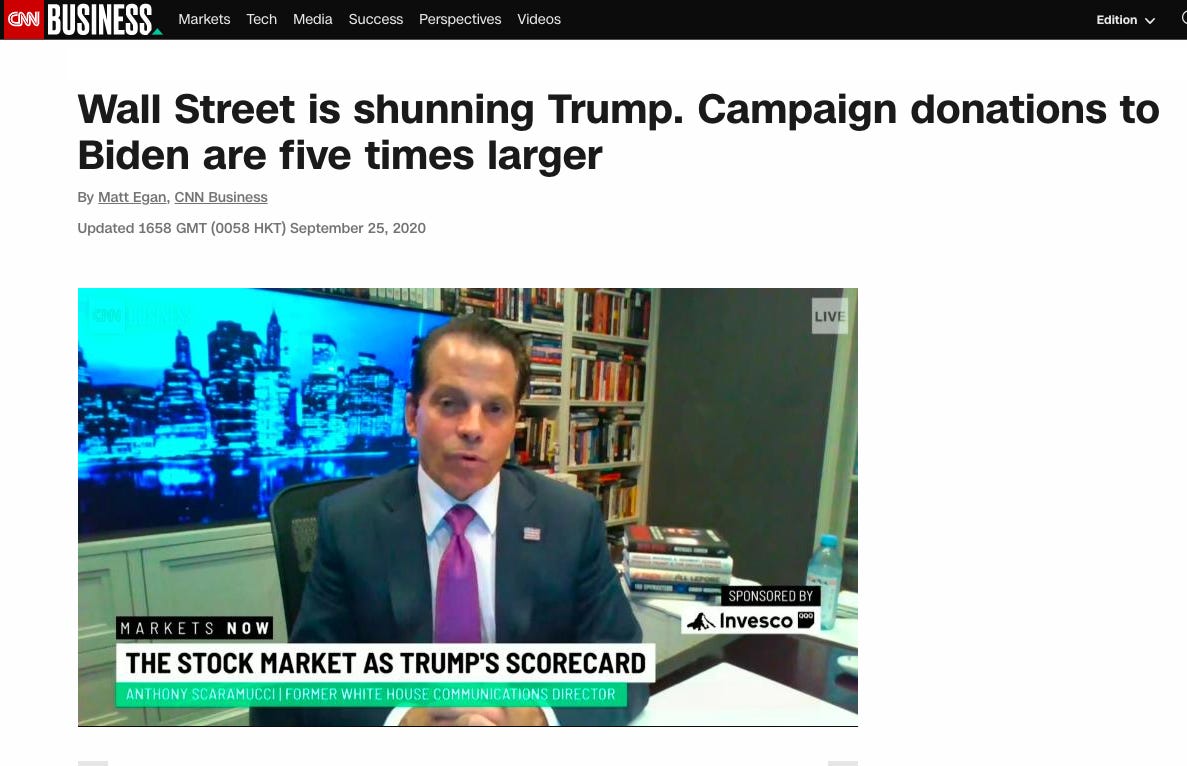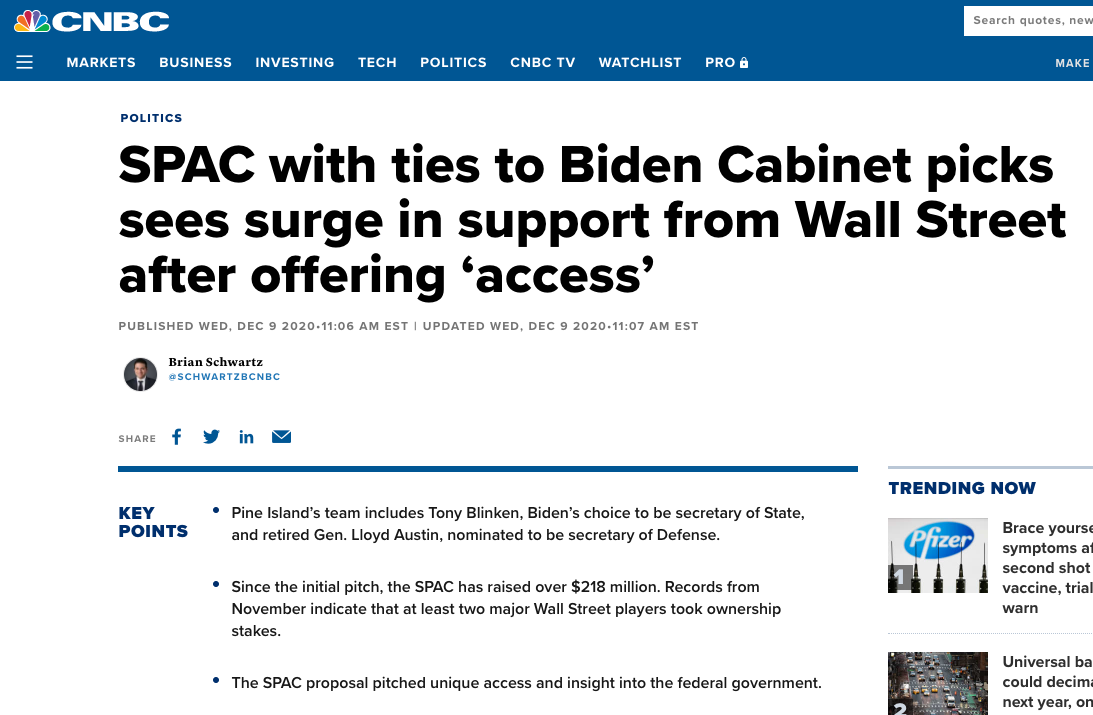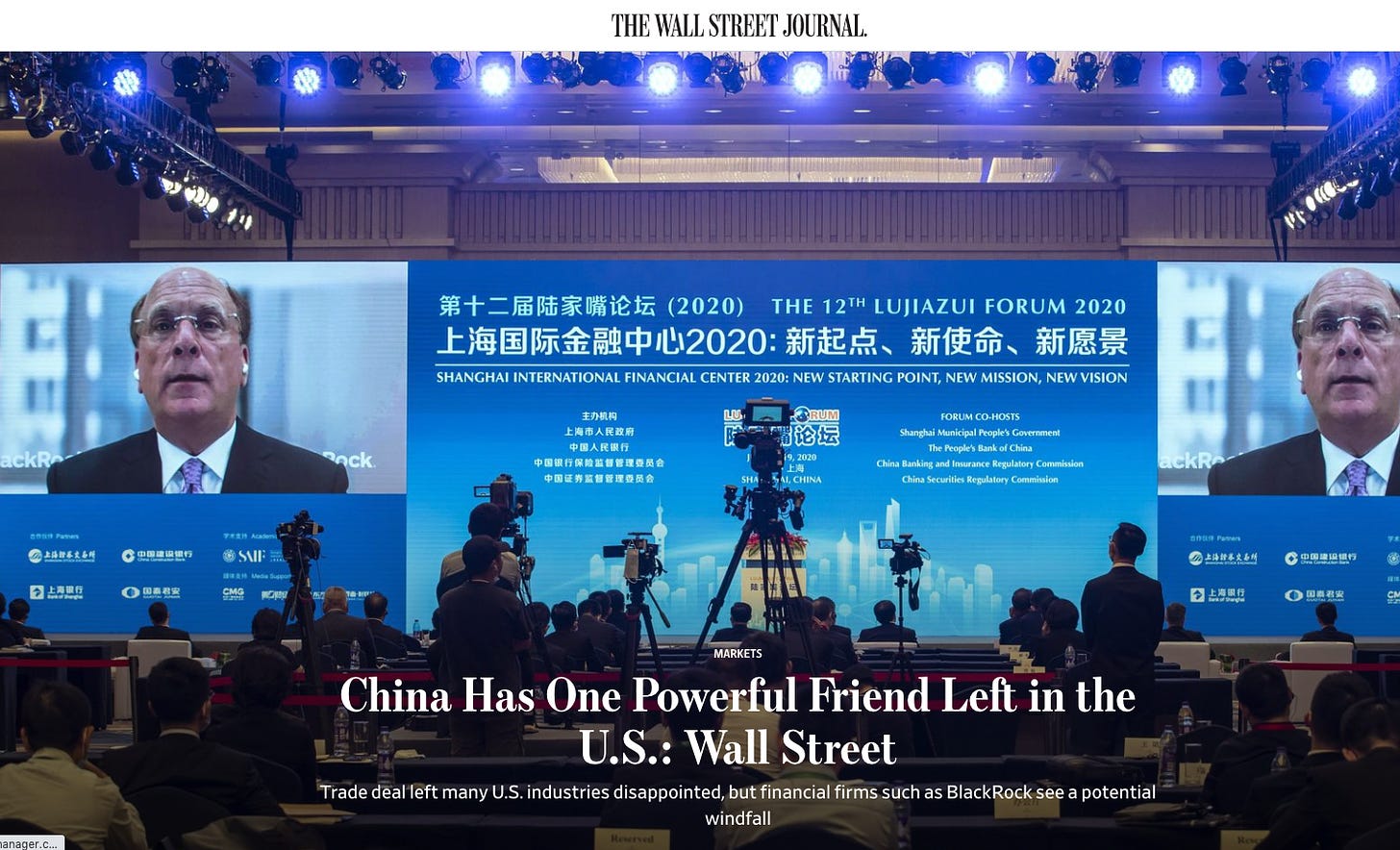Scholar's Claim About Beijing's Influence With the Biden Administration
Professor Di Dongsheng says China's close ties to Wall Street and its dealings with Hunter both enable it to exert more power now than it could under Trump.
Glenn Greenwald
9 December, 2020
Hunter Biden acknowledged today that he has been notified of an active criminal investigation into his tax affairs by the U.S. Attorney for Delaware. Among the numerous prongs of the inquiry, CNN reports, investigators are examining “whether Hunter Biden and his associates violated tax and money laundering laws in business dealings in foreign countries, principally China.”
Documents relating to Hunter Biden’s exploitation of his father’s name to enrich himself and other relatives through deals with China were among the cache published in the week before the election by The New York Post — revelations censored by Twitter and Facebook and steadfastly ignored by most mainstream news outlets. That concerted repression effort by media outlets and Silicon Valley left it to right-wing outlet such as Fox News and The Daily Caller to report, which in turn meant that millions of Americans were kept in the dark before voting.
But the just-revealed federal criminal investigation in Delaware is focused on exactly the questions which corporate media outlets refused to examine for fear that doing so would help Trump: namely, whether Hunter Biden engaged in illicit behavior in China and what impact that might have on his father’s presidency.
The allegations at the heart of this investigation compel an examination of a fascinating and at-times disturbing speech at a major financial event held last week in Shanghai. In that speech, a Chinese scholar of political science and international finance, Di Donghseng, insisted that Beijing will have far more influence in Washington under a Biden administration than it did with the Trump administration.
The reason, Di said, is that China’s ability to get its way in Washington has long depended upon its numerous powerful Wall Street allies. But those allies, he said, had difficulty controlling Trump, but will exert virtually unfettered power over Biden. That China cultivated extensive financial ties to Hunter Biden, Di explained, will be crucial for bolstering Beijing’s influence even further.
Di, who in addition to his teaching positions is also Vice Dean of Beijing’s Renmin University’s School of International Relations, delivered his remarks alongside three other Chinese banking and development experts. Di’s speech at the event, entitled “Will China's Opening up of its Financial Sector Attract Wall Street?,” was translated and posted by Jennifer Zeng, a Chinese Communist Party critic who left China years ago, citing religious persecution, and now lives in the U.S. A source fluent in Mandarin confirmed the accuracy of the translation.
The centerpiece of Di’s speech was the history he set forth of how Beijing has long successfully managed to protect its interests in the halls of American power: namely, by relying on “friends” in Wall Street and other U.S. ruling class sectors — which worked efficiently until the Trump presidency.
Referring to the Trump-era trade war between the two countries, Di posed this question: “Why did China and the U.S. use to be able to settle all kinds of issues between 1992 [when Clinton became President] and 2016 [when Obama’s left office]?” He then provided this answer:
No matter what kind of crises we encountered — be it the Yinhe incident [when the U.S. interdicted a Chinese ship in the mistaken belief it carried chemical weapons for Iran], the bombing of the embassy [the 1992 bombing by the U.S. of the Chinese Embassy in Belgrade], or the crashing of the plane [the 2001 crashing of a U.S. military spy plane into a Chinese fighter jet] — things were all solved in no time, like a couple do with their quarrels starting at the bedhead but ending at the bed end. We fixed everything in two months. What is the reason? I'm going to throw out something maybe a little bit explosive here.
It's just because we have people at the top. We have our old friends who are at the top of America's core inner circle of power and influence.
Who are these “old friends” of China’s “who are at the top of America’s core inner circle of power and influence” and have ensured that, in his words, “for the past 30 years, 40 years, we have been utilizing the core power of the United States”? Di provided the answer: Wall Street, with whom the Chinese Community Party and Chinese industry maintain a close, multi-pronged and inter-dependent relationship.
“Since the 1970s, Wall Street had a very strong influence on the domestic and foreign affairs of the United States,” Di observed. Thus, “we had a channel to rely on.”
To illustrate the point of how helpful Wall Street has been to Chinese interests in the U.S., Di recounted a colorful story, albeit one fused with anti-Semitic tropes, of his unsuccessful efforts in 2015 to secure the preferred venue in Washington for the debut of President Xi Jinping’s book about China. No matter how much he cajoled the owner of the iconic D.C. bookstore Politics and Prose, or what he offered him, Di was told it was unavailable, already promised to a different author. So he conveyed his failure to Party leadership.
But at the last minute, Di recounts, he was told that venue had suddenly changed its mind and agreed to host Xi’s book event. This was the work, he said, of someone to whom Party leaders introduced him: “She is from a famous, leading global financial institution on Wall Street,” Di said, “the president of the Asia region of a top-level financial institution,” who speaks perfect Mandarin and has a sprawling home in Beijing.
The point — that China’s close relationship with Wall Street has given it very powerful friends in the U.S. — was so clear that it sufficed for him to coyly laugh with the audience: “Do you understand what I mean? If you do, put your hands together!” They knowingly applauded.
All of that provoked an obvious question: why did this close relationship with Wall Street not enable China to exert the same influence during the Trump years, including avoiding a costly trade war? Di explained that — aside from Wall Street’s reduced standing due to the 2008 financial crisis — everything changed when Trump ascended to the presidency; specifically, Wall Street could not control him the way it had previous presidents because of Trump’s prior conflicts with Wall Street:
But the problem is that after 2008, the status of Wall Street has declined, and more importantly, after 2016, Wall Street can’t fix Trump. It's very awkward. Why? Trump had a previous soft default issue with Wall Street, so there was a conflict between them, but I won't go into details, I may not have enough time.
So during the US-China trade war, [Wall Street] tried to help, and I know that my friends on the US side told me that they tried to help, but they couldn't do much.
But as Di shifted to his discussion of the new incoming administration, his tone palpably changed, becoming far more animated, excited and optimistic. That’s because a Biden presidency means a restoration of the old order, where Wall Street exerts great influence with the White House and can thus do China’s bidding: “But now we're seeing Biden was elected, the traditional elite, the political elite, the establishment, they're very close to Wall Street, so you see that, right?”
And Di specifically referenced the work Beijing did to cultivate Hunter:
Trump has been saying that Biden's son has some sort of global foundation. Have you noticed that?
Who helped [Biden's son] build the foundations? Got it? There are a lot of deals inside all these.
The excerpts of Di’s speech can be seen below, and the translated transcript of it here.
The claims in his speech can be seen in a new light given today’s revelations that the U.S. Attorney has resumed its active criminal investigation into Hunter Biden’s business dealings in China and whether he accounted to the I.R.S. for the income (CNN’s Shimon Prokupecz says that “at least one of the matters investigators have examined is a 2017 gift of a 2.8-carat diamond that Hunter Biden received from CEFC [China Energy’]'s founder and former chairman Ye Jianming after a Miami business meeting.”
The pronouncements of this University Professor and administrator should not be taken as gospel, but there is substantial independent confirmation for much of what he claimed. That is even more true after today’s news about Hunter Biden.
That Hunter Biden received large sums of money from Chinese entities is not in dispute. A report from the U.S. Senate Committee on Homeland Security and Government Affairs earlier this year, while finding no wrongdoing by Joe Biden, documented millions in cash flow between Hunter and his relatives and Chinese interests.
Nor can it be reasonably disputed that Wall Street exerts significant influence in Democratic Party politics generally and in the world of Joe Biden specifically. Citing data from the Center for Responsive Politics, CNBC reported in the weeks before the election:
People in the securities and investment industry will finish the 2020 election cycle contributing over $74 million to back Joe Biden’s candidacy for president, a much larger sum than what President Donald Trump raised from Wall Street.
They added: “Biden also received a ton of financial support from leaders on Wall Street in the third quarter.” At the same time, said CNN, “professionals on Wall Street are shunning Trump and funneling staggering amounts of money to his opponent.” Wall Street executives, CNBC reported, specially celebrated Biden’s choice of Kamala Harris as his running mate, noting that her own short-lived presidential campaign was deluged with “contributions from executives in a wide range of industries, including film, TV, real estate and finance.”
Moreover, Biden’s top appointees thus far overwhelmingly have massive ties to Wall Street and the industries which spend the most to control the U.S. government. As but one egregious example, Pine Island Investment Corp. — an investment firm in which key Biden appointees including Secretary of State nominee Antony Blinken and Pentagon chief nominee Gen. Lloyd Austin have been centrally involved — “is seeing a surge in support from Wall Street players after pitching access to investors.”
Prior to the formal selection of Blinken and Austin for key Cabinet posts, The Daily Poster reported that “two former government officials who may now run President-elect Joe Biden’s national security team have been partners at a private equity firm now promising investors big profits off government business because of its ties to those officials.” The New York Times last week said “the Biden team’s links to these entities are presenting the incoming administration with its first test of transparency and ethics” and that Pine Island is an example “of how former officials leverage their expertise, connections and access on behalf of corporations and other interests, without in some cases disclosing details about their work, including the names of the clients or what they are paid.”
That China and Wall Street have an extremely close relationship has been documented for years. Financial Times — under the headline “Beijing and Wall Street deepen ties despite geopolitical rivalry” — last month reported that “Wall Street groups including BlackRock, Citigroup and JPMorgan Chase have each been given approval to expand their businesses in China over recent months.”
A major Wall Street Journal story from last week, bearing the headline “China Has One Powerful Friend Left in the U.S.: Wall Street,” echoed Di’s speech by noting that “Chinese leaders have time and again turned to Wall Street for assistance in periods of trouble.” That WSJ article particularly emphasized the growing ties between China and the asset-manager giant BlackRock, a firm that already has outsized influence in the Biden administration. And Michael Bloomberg’s ties to China have been so crucial that he has regularly heaped praise on Beijing even when doing so was politically deleterious.
Even the smaller details of Di’s speech — including his anecdote about the book event he tried to arrange for Xi — check out. Contemporaneous news accounts show that exactly the book event he described was held at Politics and Prose in 2015, just as he recalled.
None of this means that Trump was some sort of stalwart enemy of Wall Street. From massive corporate tax cuts to rollbacks of regulations in numerous industries and many of their own in key positions, the financial sector benefited in all sorts of ways from the Trump presidency.
But all of their behavior indicates that they view a Biden/Harris administration as far more beneficial to their interests, and far more susceptible to their control. And that, in turn, makes Beijing far more confident that they will wield significantly more influence in Washington than they could over the last four years.
That confidence is due, says Professor Di, to Beijing’s close ties to a newly empowered Wall Street as well as their efforts to cultivate Hunter Biden, efforts we are likely to learn much more about now that Hunter’s activities in China are under active criminal investigation in Delaware. We should and could have learned about these transactions prior to the election had the bulk of the media not corruptly decided to ignore any incriminating reporting on Biden, but learning about them now is, one might say, a case of better late than never.







No comments:
Post a Comment
Note: only a member of this blog may post a comment.